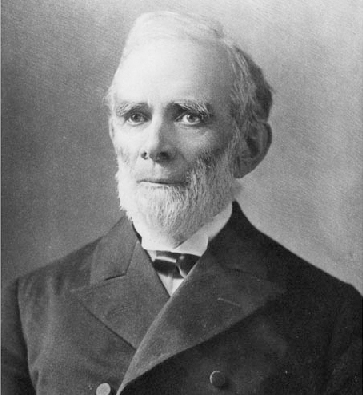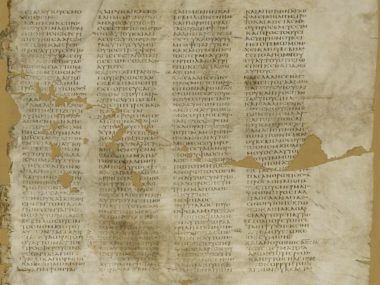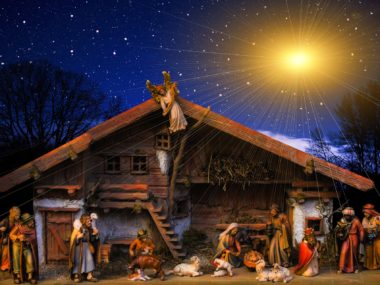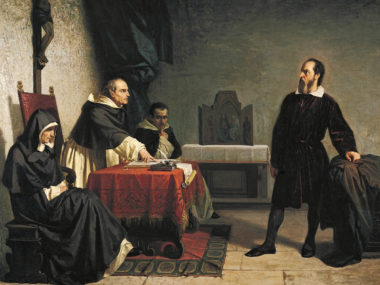For those just joining us, I am reviewing the various issues related to the genealogies of Genesis 5 and 11 (see part 1 and part 2 of the series). My goal is to better understand what we evangelical Christians ought to believe regarding the lifespans of ancient humans before and after the Flood. This week, we continue our discussion with a review of William Henry Green’s 1890 article “Primeval Chronology,” published in Bibliotheca Sacra (vol. 47, pp. 285-303). Green was a well-known Presbyterian theologian and for nearly fifty years a professor at Princeton Theological Seminary. Since his article is widely cited and influential, it makes sense to begin our close inspection of the Genesis genealogies here. You can find a free copy easily using Google.
The following article has been reblogged with permission from Todd’s Blog. The views expressed reflect those of the author, and not necessarily those of New Creation.
Green begins his article with an unfortunate over-estimate of the subject’s importance:

“The question of the possible reconciliation of the results of scientific inquiry respecting the antiquity of man and the age of the world with the Scripture chronology has been long and earnestly debated. On the one hand, scientists, deeming them irreconcilable, have been led to distrust the divine authority of the Scriptures; and, on the other hand, believers in the divine word have been led to look upon the investigations of science with an unfriendly eye, as though they were antagonistic to religious faith. In my reply to Bishop Colenso in 1863, I had occasion to examine the method and structure of the biblical genealogies, and incidentally ventured the remark that herein lay the solution of the whole matter.”
Green is correct that the age of the creation is a point of contention between some theologians and scientists; however, that is by no means the entire debate. Contemporaries of Green in the United States were hotly arguing over the question of evolution and design. That debate wasn’t prominent at Princeton, but it was certainly common in the U.S. Let us remember that the whole of science and faith does not rest on interpreting the genealogies correctly (I’ll say more about that in a future article).
The rest of the paper is divided into two sections. In the first, he rehearses the various reasons from the Bible itself that genealogies are frequently edited and abridged. The reality of abridged genealogies is undeniable, and I will not dwell upon that here. I’m far more interested in the second part of the article, where Green addresses the Genesis genealogies directly. After all, those genealogies are the ones I’m interested in.
The primary question he addresses is whether or not Genesis 5 and 11 have been abridged. His first point (helpfully numbered for us) is that by analogy, we shouldn’t just assume that the Genesis 5 and 11 genealogies are complete. Since many other genealogies in the Bible are abridged in some way, it would seem that genealogies were just abridged as a matter of course. I would say this is his strongest point, such as it is. He overplays it, though, when he tries to say that there are no other biblical genealogies comparable to Genesis 5 and 11 by which gaps could be deduced. He’s obviously aware of Matthew, Luke, and 1 Chronicles, so he must mean some kind of independent source. (In other words, the later versions of the primeval genealogies copy from Genesis.) On that point, I’m not sure he can claim that any of the other genealogies that he cited in the first part of the article are truly independent sources. Surely some of those were copied from earlier passages of Scripture? This is important because the genealogies of Luke, Matthew, and 1 Chronicles are the same as Genesis 5 and 11, with the exception of the extra Cainan in Luke.
Green’s second point directly addresses the peculiarities of Genesis 5 and 11. After all, the ages in Genesis make the primeval genealogies completely unique among all the genealogies in the Bible. In fact, the ages would seem to invite us to add up the years between creation and Abraham, and there is evidence that that is exactly what ancient interpreters did with the ages. Green claims that the ages are intended to tell us about how lifespans decreased after the Flood, and thus we cannot add up the ages to give us the span of time over the same period of early history. He supports this claim by noting that the total lifespan of each patriarch is unnecessary to establish the length of time from Creation to Abraham. His argument here is interesting but smacks of the weird habit of modern readers to insist that Bible passages have only one meaning, which (if you can figure it out) necessarily excludes all other meanings or purposes. I don’t buy that kind of reasoning, and you shouldn’t either. Every time a New Testament writer cites a prophecy of the Old Testament, we see multiple meanings apply to the OT passage.
Green’s third point is yet another analogy with a later genealogy/chronology, that of the Israelite sojourn in Egypt. Once again, the dissimilarities strike me as more important than the similarities.
Green’s fourth point is that Moses would have know about Egyptian chronology, which contradicts that of Genesis. He also points out here that the Samaritan and Septuagint chronologies differ from the Masoretic (which he calls the “Hebrew”). To this I simply ask: Could not Moses’ genealogies be intended to correct the faulty Egyptian chronology? I don’t think it’s a very compelling argument.
For his fifth point, Green notes the stylistic similarity between the genealogies of Genesis 5 and 11, which again I think is a point well worth considering. Once again, though, I think he overplays the point:
…if a chronology is to be constructed out of this genealogy, Noah was for fifty-eight years the contemporary of Abraham, and Shem actually survived him thirty-five years, provided xi. 26 is to be taken in its natural sense, that Abraham was born in Terah’s seventieth year. This conclusion is well-nigh incredible.
The conclusion is incredible? In other words, Green just doesn’t believe it. That’s not an argument, and it’s not compelling.
Green’s article raises some important points, but in my view it gets far too much regard. His arguments about the meaning of Genesis 5 and 11 are too conclusive. I think there are a lot more questions that his view doesn’t actually answer. In the next article in this series, we’ll continue looking at papers published on the genealogies, and we’ll have a look at some additional questions about Genesis 5 and 11.
Chronology Chronicles Series
Methuselah and Human Lifespan (Part I)
The Patriarchs of Genesis 5 & 11 (Part II)
Well-Night Incredible? (Part IV)












It is true that the Genesis 5 and 11 genealogies have more than one purpose, and there is a more important purpose for the genealogies than merely stressing the great ages of the ancient patriarchs. The main reason for these genealogies is to trace a line of descent leading up to Christ. In fact, if you take the names in the Gen 5 genealogy in the order they are given, they form a prophecy of the coming Christ: Roughly, their meaning is as follows: “Humanity appointed, wretched and falling. But the blessed God will descend, dedicated. His death will bring power and rest.” However, I fail to see that these genealogies are inviting us to add up the time since creation week. If the precise date for creation week was important, it would be stated plainly In their book, “The Genesis Flood,” Whitcomb and Morris supported Green’s argument for gaps, as long as the gaps are not stretched to ridiculous lengths. In fact, the Institute for Creation Research did not switch to the Ussher chronology until after Dr. Henry Morris died.
I would see a far more compelling purpose of the genealogies as Israel establishing it’s national history after the exodus. It does not specifically negate your prophetic concept – I am just wary of these type of post-hoc interpretations.
I agree with you that the genealogies established the national history of Israel after the Exodus. But Matthew and Luke also use them to trace the ancestry of Jesus.